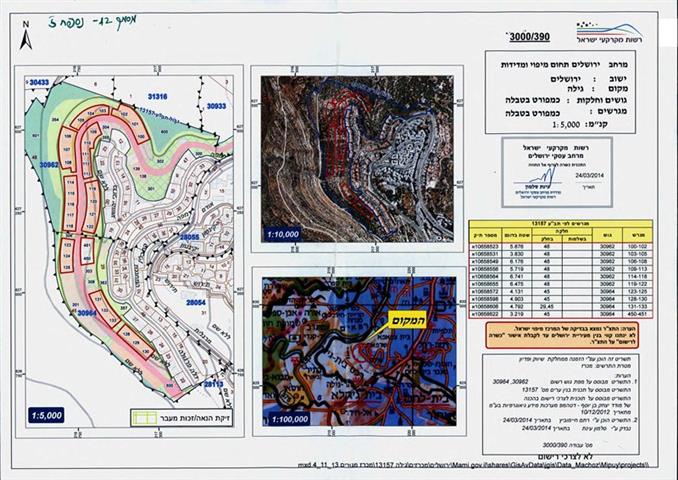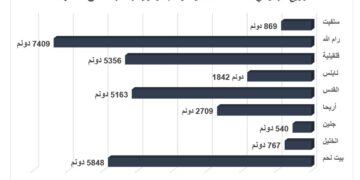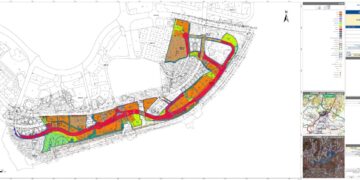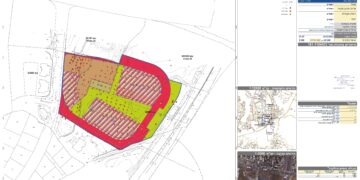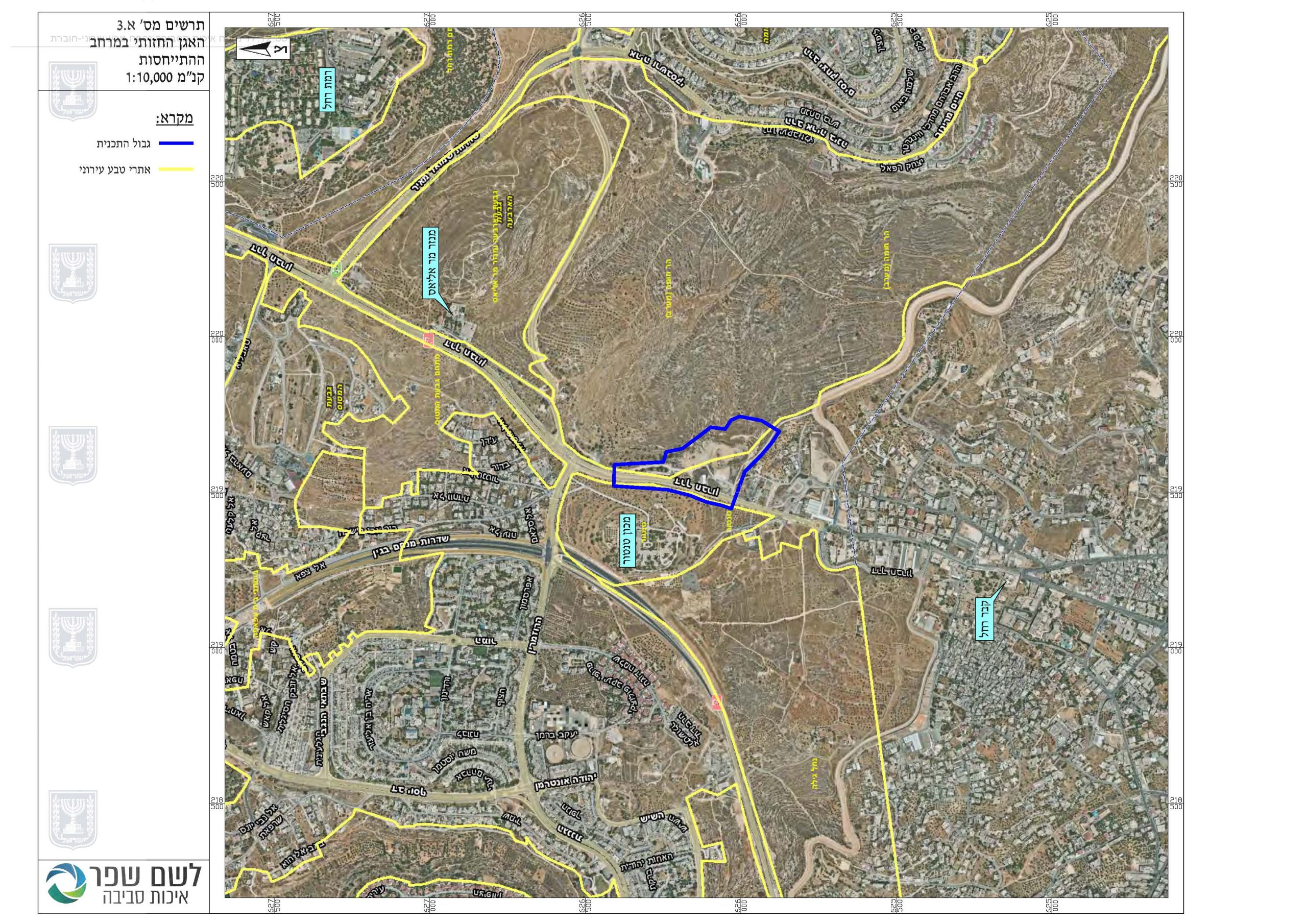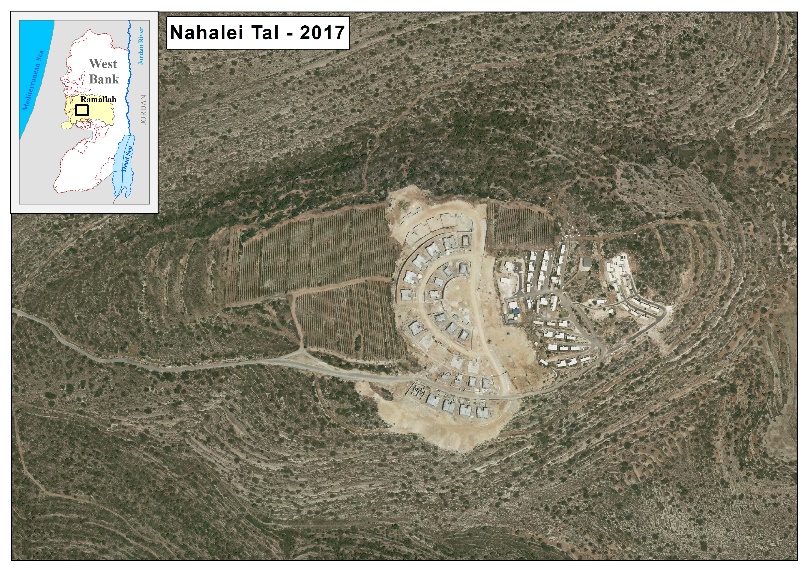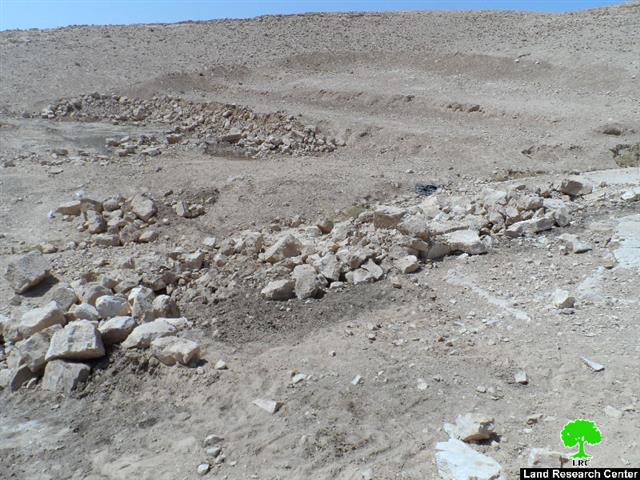The Custodian of Israeli Government Property in the occupied West Bank and the Ministry of Housing and Construction issued a number of housing tenders in Israeli settlements of occupied East Jerusalem during the month of July 2015. The tenders included the building of 77 new settlement units in Neve Ya’acov and Pisgat Ze’ev settlements, in addition to leasing four plots of land for commercial purposes in Ma’ale Adumim east of Jerusalem. Below is a detailed description of the tenders:
Neve Yacoov Settlement – north of Jerusalem
On July 6 2015, the Israeli Land Authority (ILA) issued tender No. 58/2015 (Plan 6513A) inviting offers to sign contracts for 98 years with an option to extend for another 98 years. These contracts refer to 36 new housing units on 3.8 dunums of land in Neve Ya’acov settlement north of Jerusalem city. The ILA’s deadline for submitting bids is September 21, 2015, and the ILA offered a tour to the targeted site on July 30, 2015. See Map 1
Israeli Tender No. 58/2015 in Neve Yacov settlement.
Pisgat Zeev settlement – north of Jerusalem
(a) Also on July 6 2015, the Israeli Land Authority issued tender No. 57/2015 (plan No. 11647) inviting contract offers to sign for 98 years with an option to extend for another 98 years. These refer to 18 new housing units in Pisgat Ze’ev settlement, north of Jerusalem city. The ILA sets September 21, 2015 as a deadline for submitting bids and a tour to the targeted site to be held on July 30 2015. See Map 2
Israeli Tender No 57/2015 in Pisgat Zeev settlement
(b) Another tender was issued by the Israeli Land Administration to build in Pisgat Ze’ev Settlement. The tender holds number 59/2015 (Plan No. 4430A and 20/53/5) and invites offers to the signing of contracts for 98 years, with an option to extend another 98 years, to build an additional 23 new housing units in Pisgat Ze’ev.
Ma’ale Adumim settlement – east of Jerusalem
In the Ma’ale Adumim settlement, the Custodian of Israeli Government Property in the occupied West Bank issued tender No. 84/2015 inviting proposals for signing a lease to a contract for 49 years, including an option to extend for another 49 years, to lease four plots of land for commerce and other services in Ma’ale Adumim settlement east of Jerusalem city. The tender includes four previously issued tenders published on January 23, 2015 in Ma’ale Adumim settlement, 10/2015, 11/2015, 12/2015 and 13/2015. The four plots of land fall within plan No. 420/2/4/5 and the deadline for submitting bids is September 7, 2015. See Map 3
Israeli Tender No. 84/2015 in Ma’ale Adumim settlement east of Jerusalem city.
1508 other settlement units in the oPt since the beginning of 2015
Analysis conducted by the Applied Research Institute – Jerusalem (ARIJ) showed that during the year 2015, a total of 1508 settlement units were announced to be built in Israeli settlements throughout the occupied West Bank, in addition to leasing plots of lands for the establishment of commercial and industrial areas and other facilities within the settlements themselves. Table 1 below gives details of the number of settlement units that were issued during the year 2015:
|
Table 2: distribution of new units in Israeli settlements in the occupied West Bank. |
||
|
No. |
Governorate |
No. of new settlement units |
|
1 |
Jerusalem |
254 |
|
2 |
Salfit |
216 |
|
3 |
Bethlehem |
238 |
|
4 |
Qalqilyah |
78 |
|
5 |
Nablus |
620 |
|
6 |
Hebron |
102 |
|
|
Total |
1508 |
In summary,
The issued tenders and plans reveal that Israel does not have any genuine intention to come to a peace agreement with the Palestinians. It continues to give approvals to build new housing units in Israeli settlements in the occupied Palestinian territory, especially in the occupied city of Jerusalem.
Israeli settlement activities are considered clear violations of international laws, including several UN Security Council resolutions and the General Assembly of the United Nations and the Fourth Geneva Convention (IV) relative to the Protection of Civilian Persons in Time of War, and the signed agreements with the Palestinians.
(1) UN Resolution 242 of 22 November 1967:
(i) Withdrawal of Israel armed forces from territories occupied in the recent conflict;
(ii) Termination of all claims or states of belligerency and respect for and acknowledgment of the sovereignty, territorial integrity, and political independence of every State in the area and their right to live in peace within secure and recognized boundaries free from threats or acts of force;
(2) UN Resolution 446 of 22 March 1979:
Determines that the policy and practices of Israel in establishing settlements in the Palestinian and other Arab territories occupied since 1967 have no legal validity and constitute a serious obstruction to achieving a comprehensive, just and lasting peace in the Middle East;
(3) UN Resolution 452 of 20 July 1979:
Calls upon the Government and people of Israel to cease, on an urgent basis, the establishment, construction and planning of settlements in the Arab territories occupied since 1967, including Jerusalem;
(4) UN Resolution 465 of 1980:
Strongly deplores the continuation and persistence of Israel in pursuing those policies and practices and calls upon the Government and people of Israel to rescind those measures, to dismantle the existing settlements and in particular to cease, on an urgent basis, the establishment, construction and planning of settlements in the Arab territories occupied since 1967, including Jerusalem; and calls upon all States not to provide Israel with any assistance to be used specifically in connection with settlements in the occupied territories;
(5) Paragraph 6 of Article 49 of the forth Geneva Convention relative to the Protection of Civilian Persons in Time of War states that Individual or mass forcible transfers, as well as deportations of protected persons from occupied territory to the territory of the Occupying Power or to that of any other country, occupied or not, are prohibited, regardless of their motive.
(6) ARTICLE 53 of the fourth Geneva Convention states that: “ Any destruction by the Occupying Power of real or personal property belonging individually or collectively to private persons, or to the State, or to other public authorities, or to social or cooperative organizations, is prohibited, except where such destruction is rendered absolutely necessary by military operations.”
Prepared by:
The Applied Research Institute – Jerusalem


